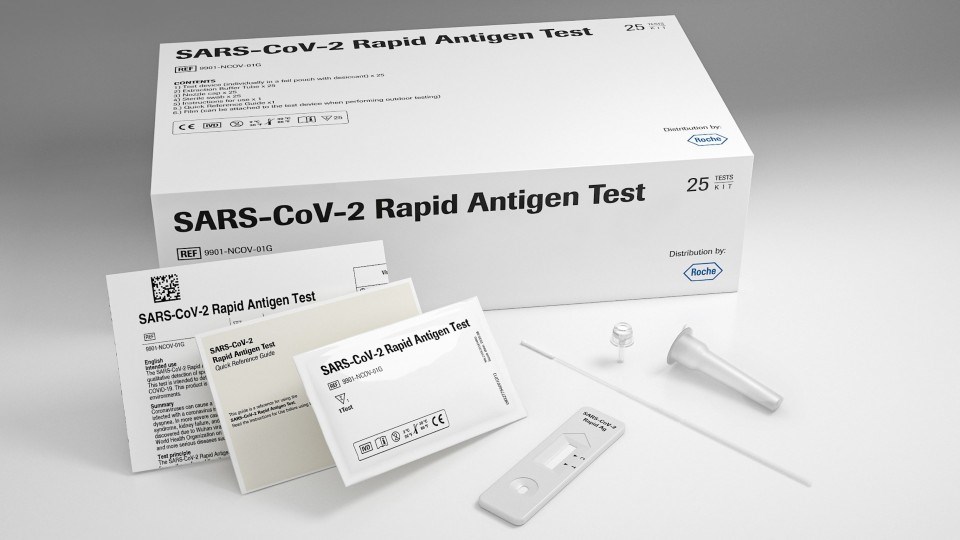Ontario’s COVID-19 Science Advisory Table has released its recommendations for rapid antigen tests specifically in elementary schools, amid calls for the Ford government to expand access to the tests across the province.
The recommendations focus on “voluntary screen testing” — which tests asymptomatic individuals at regular intervals in moderate-risk settings such as schools and places of employment.
“We found that rapid antigen tests can be a useful tool to reduce transmission in schools when used for voluntary screen testing to identify infectious cases in Public Health Units or neighbourhoods,” the report stated.
“We considered elementary schools a priority for voluntary screen testing given that students less than 12 years of age are not fully vaccinated in Ontario.”
The table said if the virus case rate in a public health unit or neighbourhood reaches 50 cases per million per day (35 cases per 100,000 per week), it advises voluntary screen testing of unvaccinated individuals in elementary schools once a week. It said public health units in this case may also roll out rapid testing in workplaces and congregate settings.
However, if the rate hits 250 cases per million per day (175 cases per 100,000 per week), the recommendation is that unvaccinated people and possibly also vaccinated people be tested two to three times a week.
“We looked very specifically at the situation in elementary schools … we have quite a lot of outbreaks in schools and we want to keep in-person learning going,” said Dr. Peter Juni, the scientific director of the advisory table.
The table also recommended the “test to stay” approach in schools when an individual has been exposed to someone with the virus but doesn’t have symptoms.
“With this approach, contacts are offered daily rapid antigen testing as an alternative to self-isolation, and can continue with in-person learning as long as they test negative and remain asymptomatic for a defined risk period after exposure,” the table states in its report.
Juni said the downside of rapid tests is false positives, which would lead to a false alarm and shut down schools, having students go back to remote learning.
“There is a possibility, this has been evaluated in the U.K., to offer voluntarily students who are in a class, [that they] can basically test daily with rapid tests. As long as these tests stay negative, they can continue to be in class and have in-person learning,” Juni said.
The advisory table also looked at COVID-19 viral loads and how that would impact rapid tests. It said people infected with the Delta variant have viral loads that peak soon after being exposed to the strain, which means high viral loads are likely to be present before symptoms appear.
Although the high viral loads make the Delta challenging to control, the table notes they “may also improve the performance and expand the practical utility of rapid antigen tests.”
“We determined whether cases with high viral loads/low cycle thresholds are likely to be infectious, and if so, whether rapid antigen tests can reliably detect those cases,” the report states.
However, the table also advises that people who get a positive result from the rapid test should self-isolate and take a PCR test.
“If you have a positive rapid test, you always need to confirm it with a PCR test because it could still be a false alarm,” Juni said.
The Ford government has been facing growing calls to have rapid tests be available for free to everyone in the province. However, Juni said rapid testing should focus on schools for now.
“I think we do that step-wise … focus, from my perspective, on those places that are really most affected … because students are in these schools together… Now, we should focus on that and try to sort out where the challenges are,” Juni said.
In its report, the table said rapid tests can potentially be used in a wide range of settings such as homes, and provide immediate results.
“Accurate rapid antigen testing could be a useful tool for detecting COVID-19 early and isolating infected people before they have a chance to spread the virus,” the report stated.
On Wednesday, Premier Doug Ford defended the province’s approach to COVID-19 testing. When asked why rapid tests aren’t free for all Ontarians, Ford pointed to the 33 million rapid tests already distributed by his government and referenced other testing initiatives like the free five tests for students.
Some Ontario workplaces offer rapid tests for their employees, and children in publicly funded schools are being sent home for the December break with a kit of five rapid tests each.
But for the most part, the tests that offer results within around 15 minutes are not freely available to people who simply want to rule out an asymptomatic COVID-19 infection.
Ontario offers free PCR testing to those with COVID-19 symptoms, close contacts of a case and members of certain groups. Those tests are available at assessment centres and pharmacies, among other locations, and the province says most results are ready in 48 hours.
In addition to the programs providing rapid tests for free to businesses and schools, they can be accessed for a fee at pharmacies for travel or other asymptomatic uses.
